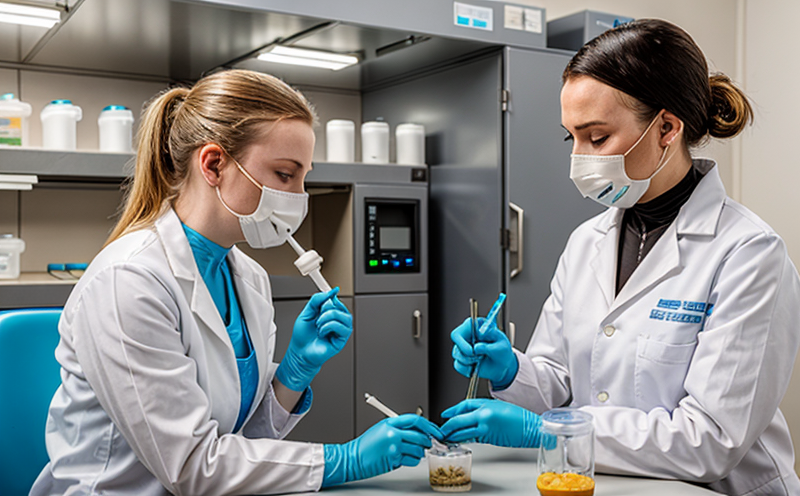EN 19375 Multi-Mycotoxin Screening in Organic Cereals
The European Standard EN 19375 provides a harmonized method for the multi-mycotoxin screening of organic cereals. This service focuses on detecting and quantifying multiple mycotoxins, which are toxic metabolites produced by fungi (molds) that can contaminate agricultural products like barley, oats, wheat, rye, and others used in food and feed production.
The importance of this screening cannot be overstated. Mycotoxins pose significant health risks to both humans and animals when present at high levels. They are known carcinogens and can cause a range of adverse effects including liver damage, immune suppression, and reproductive issues. Ensuring the safety of organic cereals is crucial for maintaining public trust in food products.
The EN 19375 method covers the detection of several mycotoxins that have been classified as priority contaminants by international bodies such as the European Food Safety Authority (EFSA) and the World Health Organization (WHO). This includes aflatoxin B1, deoxynivalenol, zearalenone, fumonisin B1, and others. The standard specifies a validated liquid chromatography-tandem mass spectrometry (LC-MS/MS) approach which offers high sensitivity and specificity for the simultaneous analysis of these toxins in organic cereals.
The process involves initial sample preparation, including grinding and extraction, followed by instrumental analysis using advanced chromatographic techniques. This ensures accurate quantification even at very low levels, making it an essential tool in quality assurance programs aimed at ensuring compliance with EU regulations on food safety.
In this service, we employ state-of-the-art instrumentation to achieve precise results. Our laboratory adheres strictly to the requirements set forth by EN 19375, ensuring that each batch of organic cereals undergoes thorough testing before being released into commerce or further processed for human consumption. The results are reported accurately and promptly, allowing our clients to make informed decisions about their products.
Our team of experts works closely with quality managers, compliance officers, R&D engineers, and procurement teams to provide comprehensive support throughout the mycotoxin screening process. We offer guidance on sample collection methods, interpretation of results, and strategies for mitigation if contamination is detected.
International Acceptance and Recognition
- The European Standard EN 19375 has gained widespread acceptance in the EU member states as a benchmark for mycotoxin screening in organic cereals.
- This standard is recognized by regulatory bodies such as EFSA, WHO, and FAO (Food and Agriculture Organization).
- It is also used by international trade organizations to ensure consistent quality standards across borders.
- The methodology is endorsed by various national standards institutions including DIN Deutsches Institut für Normung e.V. in Germany, AFNOR in France, and SIS in Sweden among others.
Environmental and Sustainability Contributions
By ensuring that organic cereals meet stringent mycotoxin standards, this service plays a vital role in protecting both human health and animal welfare. It contributes to sustainable agricultural practices by promoting safe food production processes.
The use of advanced analytical techniques like LC-MS/MS helps reduce the environmental footprint associated with frequent testing while maintaining high levels of accuracy and reliability. This approach supports long-term sustainability goals within the food industry, ensuring that products remain safe over extended periods without compromising quality standards.
Use Cases and Application Examples
| Application Scenario | Description | Outcome |
|---|---|---|
| Pre-harvest Surveillance Programs | Testing organic cereals before harvest to identify potential contamination risks early. | Prioritizes resources for targeted interventions, enhancing overall crop quality and safety. |
| Post-harvest Quality Control | Screening harvested crops post-processing to ensure compliance with EU regulatory limits. | Achieves consistent product quality, building customer confidence in organic cereals. |
| Supply Chain Transparency | Verification of mycotoxin levels at various stages of the supply chain from farm to fork. | Facilitates traceability and accountability along the entire value chain. |





